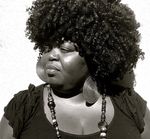"Verortung postkolonialen Denkens & intervenierende Ansätze" 07./ 08. Mai 2021 - PROGRAMM
←
→
Transkription von Seiteninhalten
Wenn Ihr Browser die Seite nicht korrekt rendert, bitte, lesen Sie den Inhalt der Seite unten
PROGRAMM
"Verortung postkolonialen Denkens &
intervenierende Ansätze"
Online-Symposium (ZOOM)
07./ 08. Mai 2021
Facebook-Veranstaltung
https://fb.me/e/3QD8eAKEe
jederzeit Postkoloniale Multimedia-Stadtführung durch
Bayreuth (deutsch) - onlineFREITAG/ 7. Mai
14-15:30 Uhr Einführender Vortrag (englisch)
"From Coloniality of Knowledge
to Decolonial Thought" von:
Prof. Dr. Sabelo
Ndlovu-Gatsheni
(Universität Bayreuth)
15:30-16 Uhr Pause
16-18 Uhr Podiumsdiskussion (deutsch)
- moderiert von Nini Manda Farrokhi
"Decolonize Activism: antirassistische
Perspektiven von":
(c)Lutz Knospe
Imeh Ituen Hamze Bytyçi Nora Teuma Mihir Sharma
Mitglied im "Black vielfältig politisch (P&E) Studentin, Aktivist, wissenschaft-
Earth Kollektiv", aktiv, Vorsitzender Aktivistin licher Mitarbeiter
wissenschaftliche RomaTrial e.V. (Universität Bayreuth) (Universität Bayreuth)
Mitarbeiterin
(Universität Hamburg)
ab 18 Uhr Vernetzungsmöglichkeit
über Plattform "Wonder"19-21 Uhr Filmic talk (englisch)
"Indigenous Activism and Film in Brazil"
mit:
Roberto Romero Sueli Maxakali Isael Maxakali Carolina Canguçu
Anthropologe Indigene Künstlerin Indigener Künstler Anthropologin
SAMSTAG/ 8. Mai
12-14 Uhr Lunchtalk mit filmischen
Elementen (englisch)
- auf 25 Teilnehmende begrenzt
"Remembering is inventing
the present" mit:
Froilán Urzagasti
Filmemacher,
Student (DFFB)
14-15 Uhr Pause
15-17 Uhr Poetry Performance & Gespräch
(englisch & deutsch)
"Widerständige Poesie -
marginalised poetry matters" von:
Stefanie-Lahya Aukongo
Künstlerin, AutorinLINKS & DETAILLIERTE INFOS
(bitte für jede Veranstaltung im Voraus registrieren)
"Postkoloniale Multimedia-Stadtführung"
https://www.digiwalk.de/walks/bt-pk/de
"From Coloniality of Knowledge to Decolonial Thought"
Anmeldung: https://uni-bayreuth.zoom.us/webinar/register/WN_kGDyUYvxTyCxyjzr5G6bJg
Prof. Sabelo Ndlovu-Gatsheni holds the chair of Epistemologies of the
Global South at the University of Bayreuth and is a member of the Africa
Multiple Cluster of Excellence. His more than 100 publications in the
fields of African History, African Politics, African Development and
Decolonial Theory include "Coloniality of Power in Postcolonial Africa-
Myths of Decolonization" (2013), "Epistemic Freedom in Africa
Deprovincialization and Decolonization" (2018) and "Decolonization,
Development and Knowledge in Africa: Turning over a New Leaf" (2020).
Prof. Dr. Sabelo Ndlovu-Gatsheni is one of the most important scholars
in the field of decolonial theory and decolonization of knowledge.
"Decolonize Activism: antirassistische Perspektiven"
Anmeldung: https://uni-bayreuth.zoom.us/webinar/register/WN__qOgQQL4SDeGWG5iE9OtJg
Imeh Ituen hat Sozialwissenschaften, Umweltmanagement und
Indigenous Australian Studies studiert. Seit Oktober 2020 ist sie
wissenschaftliche Mitarbeiterin am Lehrstuhl Globale Klimapolitik der
Universität Hamburg. Als Aktivistin und Wissenschaftlerin beschäftigt
sich Imeh Ituen mit Fragen von Kolonialität und Rassismus in der
Umwelt- und Klimakrise. Sie ist Teil von Black Earth einem BIPoC
Umwelt- und Klimagerechtigkeitskollektiv in Berlin.
Hamze Bytyçi, geboren in Prizren, Kosovo, hat zahlreiche Bündnisse,
Vereine und regelmäßige Formate mitinitiiert, u. a. Amaro Drom e.V.,
die alljährlichen Gedenkveranstaltungen anlässlich des Gedenktags an
den Genozid an Sinti* und Roma* am 2. August in Auschwitz und in
Berlin, das Bündnis für Solidarität mit den Sinti und Roma Europas, die
LinksKanax*, das Aktionsbündnis ABA, den ROMADAY am 8. April in
Berlin, die Roma-Biennale und das Roma-Filmfestival AKE DIKHEA?.
Seit 2012 ist er Vorsitzender von RomaTrial e. V.
(weitere Podiums-Diskutant*innen auf der nächsten Seite)LINKS & DETAILLIERTE INFOS
(bitte für jede Veranstaltung im Voraus registrieren)
Nora Teuma hat während ihres Studiums in Bayreuth die HeForShe
Hochschulgruppe gegründet, sowie die Initiative „Diversity in P&E"
(Philosophy & Economics). In diesem Rahmen konnte sie verschiedene
Projekte zum Thema Geschlechtergerechtigkeit organisieren, Räume
zum Austausch über Geschlechterverhältnisse bilden und in ihrem
Studiengang mehr Sensibilität für das Thema Diversität in der Lehre
schaffen. Als DGVN Jugendbeobachterin zur UN Frauenrechtskomission
hat sie die nationale und internationale Gleichstellungspolitik
Deutschlands miterleben und mitgestalten können und freut sich dies
als neu gewähltes Mitglied im Vorstand von UN Women Deutschland
weiter tun zu können.
Mihir Sharma (er/ihn) ist wissenschaftlicher Mitarbeiter und Mitglied
der Forschungsgruppe “Anthropologie globaler Ungleichheiten” am
Lehrstuhl für Ethnologie. Er forscht zu Rasse, Rassismus, und Anti-
Rassismus in dem Kontext von sozialen Bewegungen mit Fokus auf
Black Lives Matter in St. Louis, Missouri, U.S.A. In Berlin und Bayreuth
ist er in migrantischen, dekolonialen und BIPOC Gruppen aktiv. Er
schreibt für Zeitschriften wie Jacobin und Analyse und Kritik zu Themen
von Umweltaktivismus, Anti-Rassismus, und zu sozialen Bewegungen.
Seit 2017 lehrt an der Universität Bayreuth. Er ist Mitglied der
Gewerkschaft Erziehung und Wissenschaft Bayern (GEW) und
Mitveranstalter der Netzwerken “Race and Ethnicity” und “Social
Movements” bei der European Association for Social Anthropologists
(EASA).
Link für Vernetzung auf Plattform "Wonder"
https://www.wonder.me/r?id=8f3a935b-db2c-43ec-a10e-33df495c3bb1LINKS & DETAILLIERTE INFOS
(bitte für jede Veranstaltung im Voraus registrieren)
"Indigenous Activism and Film in Brazil"
Anmeldung:
https://uni-bayreuth.zoom.us/meeting/register/u5wpcuysrjoiGt0GEq7glmLIMD1n_Wig0DbK
Colonialism is an on-going process in what are now called the Americas:
white settlers have dispossessed indigenous people from their territories
and caused ecological destruction since 1492. In this talk, we will discuss
decolonial resistance, filmmaking and activism in difficult times in
Brazil, with visual anthropologists Roberto Romero, Carolina Canguçu
and indigenous artists Sueli and Isael Maxakali, who directed the award-
winning documentary “Nũhũ yãgmũ yõg hãm: This Land Is Our Land"
(2020).
Film Screening
Nũhũ yãgmũ yõg hãm: This Land Is Our Land (Isael Maxakali, Sueli
Maxakali, Carolina Canguçu, Roberto Romero, 70', 2020):
In the past, when white people didn’t exist, we used to hunt with our
yãmĩyxop spirits. The whites came, cut down the trees, dried up the
rivers and scared the animals away. Today, our tall trees are over, the
whites surrounded us and our lands are tiny. But our yãmĩyxop are very
strong and taught us the stories and chants from our ancients who
walked around here.
Roberto Romero holds a PhD in Social Anthropology from the National
Museum / Federal University of Rio de Janeiro, Brazil, where he is a
member of the symmetric anthropology center NanSi. He is also a
member of Associação Filmes de Quintal and one of the organizers of the
forumdoc.bh, Belo Horizonte's Documentary and Ethnographic Film
Festival.
short-bios of the filmmakers continuiung on the next pageLINKS & DETAILLIERTE INFOS
(bitte für jede Veranstaltung im Voraus registrieren)
Sueli Maxakali is a photographer, filmmaker and educator. She is is a
member of the Tikmū’ūn indigenous community. She co-directed the
films "Quando os yãmiy vêm dançar conosco" (2011), "Yãmiyhex: as
mulheres-espírito" (2019) and "This Land Is Our Land!" (2020). She
published the photo book "Koxuk Xop Imagem" (Beco do Azougue
Editorial, 2009), with photographs of the Maxakali women on the rituals
and daily life of Aldeia Verde.
Isael Maxakali is an award-winning visual artist and filmmaker. He is
also a member of the Tikmū’ūn indigenous community. He directed the
films “Tatakox” (2007); "Xokxop pet" (2009); “Yiax Kaax - Fim do
Resguardo” (2010); “Xupapoynãg” (2011); "Kotkuphi" (2011); “Yãmîy” (2011);
“Mîmãnãm” (2011); “Quando os yãmîy vêm dançar conosco” (2011);
“Kakxop pit hãmkoxuk xop te yũmũgãhã” (“Iniciação dos filhos dos
espíritos da terra”, 2015), “Konãgxeka: o Dilúvio Maxakali” (2016) and
"Yãmiyhex: as mulheres-espírito" (2019) and "This Land Is Our Land!"
(2020). In 2020, he won the PIPA Online Award, one of the main
contemporary art awards in Brazil.
Carolina Canguçu is a master in Social Communication at UFMG and
currently coordinates the Interprogramming of TV Educativa da Bahia.
She is an editor, researcher, film teacher and curator of documentary
exhibitions. She works with traditional peoples in audiovisual training
courses. She joined the collective Filmes de Quintal for 12 years, holding
forumdoc.bh, Belo Horizonte's Documentary and Ethnographic Film
Festival.
"Remembering is inventing the present"
Anmeldung:
https://uni-bayreuth.zoom.us/meeting/register/u5Eod-2spzMjHN2glZdw8AyudHpU7To6GwlT
A conversation about spaces, the otherness and memory. We’ll screen the
short film Roundtrips (11’, 2020) and a sequence of the film in
construction Runaway Horses (14’, 2021).
Roundtrips: We must wait to go out. Time goes by differently in the
outskirts. People look at things differently.
Runaway Horses: Trying to remember a rural space that doesn’t exist
anymore. Reconstructing, reinventing the past gives us hints of the
present… and the future.
You’re invited to have something to eat during the meeting!
bio of the contributor on the next pageLINKS & DETAILLIERTE INFOS
(bitte für jede Veranstaltung im Voraus registrieren)
Froilán Urzagasti is a filmmaker born in La Paz, Bolivia. His work
explores the possible intersections between fiction and non-fiction films,
memory as a way of understanding the present, the places from which
different people see and experience reality and the clash between the
rural space and the cities. He studied Film studies in the School for Film
and Audiovisual Arts (ECA) in Bolivia and is currently studying Film
Direction at the German Film and Television Academy Berlin (DFFB) in
Germany.
"Widerständige Poesie - marginalised poetry matters"
Anmeldung:
https://uni-bayreuth.zoom.us/meeting/register/u5Alfuqpqz8sGdRm0K5uBmcwEPaxb6y06hbs
Eine Poetry Performance oder auch Befreiungspoesie aus mehrfach
unterdrückter Perspektive und Arbeit mit Emotionen. Außerdem ein
Gespräch mit Lahya, welchem gelauscht werden kann, in welchem
Austausch stattfinden soll und wo Fragen der Teilnehmenden
willkommen sind.
Lahya (Stefanie-Lahya Aukongo) ist eine Schwarze intersektional
verwobene Künstlerin, Autorin, Poetin, Kuratorin, Multiplikatorin,
Sängerin, Aktivistin, Workshop-Teamerin und Fotografin, deren
gesellschaftliche Realitäten sich in all ihrer Kunst und Arbeit
widerspiegeln. Seit 2014 kuratiert und moderiert Lahya die monatliche
Spoken-Word-Veranstaltungsreihe „One World Poetry Night“ in Berlin.
Ihre poetischen Texte sind in verschiedenen Publikationen und Zines zu
finden. Ihre zwei Bücher heißen „Kalungas Kind“ und
„Buchstabengefühle - eine poetische Einmischung“. Im Frühling 2021
kommt Lahyas erstes E-book „Sperrlinien“ ins Internetz. All das was
Lahya macht ist politisch und privat. Ihre Inhalte berühren Privilegien,
individuelle und kollektive Verletzlichkeit sowie eine radikale
Gesellschaftsverantwortung. Es geht um Heilung und um
transformative Praktiken. Lahyas Bett wohnt in Berlin.
das Symposium wird unterstützt durch
Lehrstuhl Ethnologie
(Universität Bayreuth)Sie können auch lesen



























































